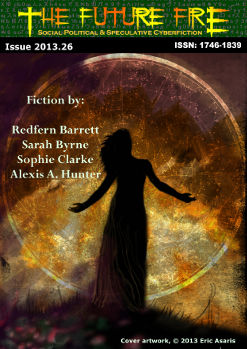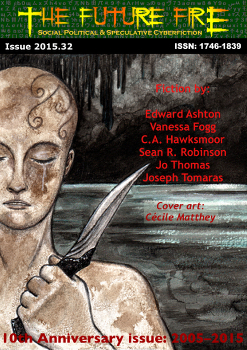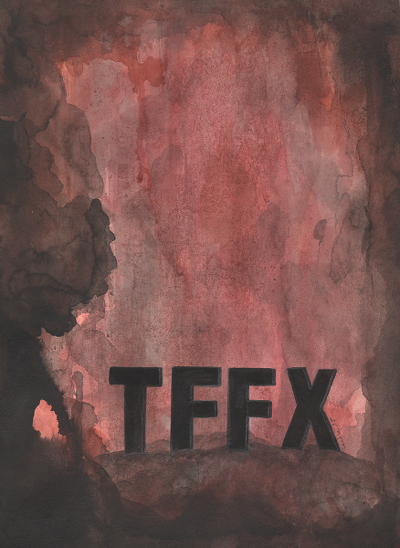Interview with Djibril al-Ayad of The Future Fire
The Future Fire, a magazine of speculative fiction, is celebrating ten years of publishing! Take a moment to tremble in awe, won’t you? It’s hard out there for any small publisher, but TFF carved out a niche by embracing social and political themes in the stories they publish. Read on to learn from editor Djibril al-Ayad how the magazine operates, what TFF is looking for in terms of new content, and what future fires will be sparked.

TFF publishes speculative fiction (along with reviews and essays), but not just any SF. How would you define your niche and the sort of stories you want to champion?
A: It’s a little bit tough to define exactly what our niche is, although I think we all know it when we see it. As a very rough parameter I think we’re mostly interested in socio-political SF, what some might call “soft” SF. So we mostly focus on stories in which the future setting (or past, or alternative universe, or surreal dreamscape) explored through the differences in society, in people’s interactions, and in our treatment of each other, rather than through technology or magic or whatever. This also leads to a focus on what might be called “social justice” themes. And we’re actively interested in underrepresented voices—stories by and about women, people of color, non-Anglophones, the Quiltbag spectrum, people with disabilities, and so forth. But above all this we love poetic writing, quirky world-building, a synesthetic eye for the truth, Borgesian mischievousness and unapologetic passion!
It seems like the half-life for online magazines is about six months. What’s been the key to maintaining a consistent production schedule for a decade? How do you sustain a passion for publishing?
A: The key I think has been really really wanting to do this! It helped that from day one there was no pressure to succeed financially in order to keep going: we’ve never been profit-making, and don’t want to be. I edit for the same reason I write, and other people draw, or sing, or run: because I have to. I can’t imagine not doing. But what really keeps us going is that it’s fun: it’s fulfilling to spend time discussing stories with my co-editors; it’s a privilege to read so many good stories and decide on a few to publish; it’s valuable to participate in fora, social media discussion, panels, and impromptu hangouts with other writers, fans and editors about topics that matter to us all. Maybe if it were a day job it wouldn’t be this way. (Although I do feel the same about my day job, but that’s another story…)

What advice do you have for authors looking to submit work to TFF? I don’t mean submission guidelines, since those don’t have to telepathized. They’re very clearly written here. I mean advice on attitude and focus, or whatever you’ve got in your editor heart right now.
A: I don’t think one can dictate to writers or influence what they write; we can tell them what we want to read, so that only those who are already writing that stuff send it in, but (a) we already do that, as you say, and (b) a lot of authors will ignore that, which is why like everyone 75% of our slush is made up of perfectly good but just inappropriate stories. So I’m not sure if I can give authors advice on how to write, or what I wish they’d focus on, but I would channel my telepathic ability into persuading more underrepresented writers to consider us as a venue. Nothing is too experimental in style or content for us. We don’t mind if your story contains words from languages other than (US-) English. (We’re more interested in Singlish or Kreyol than we are in Klingon!) We want your passion more than we want an MFA graduate’s flawless prose. We want your unique voice more than we want whatever Locus or the Hugos tell us is selling this year.
What changes have you seen over the last ten years in terms of overarching themes in spec fic? I’m thinking not only of the new exploration and growing normalization of, say, feminist or queer SF, but also of trends like utopias vs dystopias, or the “no heroes, please, we’re cynical” style of spec. What do you think is next? What would you like to see?
A: Ahhh, I wish I had the perspective to answer this with any kind of authority. I think my perception of the changes over the last ten years are as much about my growing awareness of the peripheries of genre (I’m not sure whether they’re moving or I’m just seeing them better): YA, science fiction romance, queer and postcolonial steampunk, or whatever. Yes there are trends, such as the social justice anthologies and novels, their growing recognition in the major awards, and the reactionary backlash against them by puppies and other immature types. I’ve always thought an ugly backlash is a sign that you’re winning, but it’s still not a nice thing to sit though. (The “no heroes” style has been around for a while, hasn’t it? There was some of that in New Weird (and Old Weird) for that matter, but it feels to me like a borrowing from “literary” fiction, where protagonists are supposed to get worse, not better!) So I don’t like to predict what will happen next, except that as usual things probably get worse before they get better—or maybe it’s that as we make progress in one area, we are reminded how much more we have to do in so many others. But I would like to see boundaries come down, more exposure to authors from outside our comfort zones, ways for indie authors to be accepted into the mainstream (which is a problem of filtering, not of quality), diverse voices being heard without the old guard having to feel threatened by it.
What do you have planned for the magazine in the next year, five years, and/or millennium?
A: Well, at the moment we’re running a fundraiser at Indiegogo to raise money to publish a celebratory ten-year anthology “The Future Fire Ten” or TFFX.

(Um... I LOVE this cover, btw. -- Jocelyn)
This volume will reprint a dozen or so representative stories from the last decade, plus a wad of new material: micro-sequels, ekphrastic pieces, reviews of non-existent products, new stories, poems, illustrations. If we do really well, we’ll use any extra funds we raise to increase the pay rate for TFF for the next year—as I said earlier, we’re not interested in making a profit even for a minute! Basically, this is a chance for readers to pre-order a copy of the anthology, or pick up our previous volumes if they’ve missed them, or be more generous and nab one of the higher-level rewards such as a customized, knitted zombie in their likeness, or original fantasy art.
Otherwise, we have a call for stories open at the moment for Fae Visions of the Mediterranean, a horror anthology that is trying to attract authors from Southern Europe, North Africa and the Near East. Next year we might finally launch the long-discussed sequel to We See a Different Frontier, the postcolonial spec-fic anthology. But in the meantime we’re going to contain ourselves to themed issues of the magazine for a little while, because fundraising for and editing a full-scale anthology is hard work, both for us, and for our allies and generous supporters who make it all possible. But we’re not going anywhere, and there will be more big projects in the future!
Hey, everyone. It's Jocelyn again. If you've read this far, you should definitely support the fundraiser if you're able. TFF was one of the very first places where I got a story published, so it's absolutely key to providing a space for new voices. Thanks for reading. Now go forth and do awesome things!
